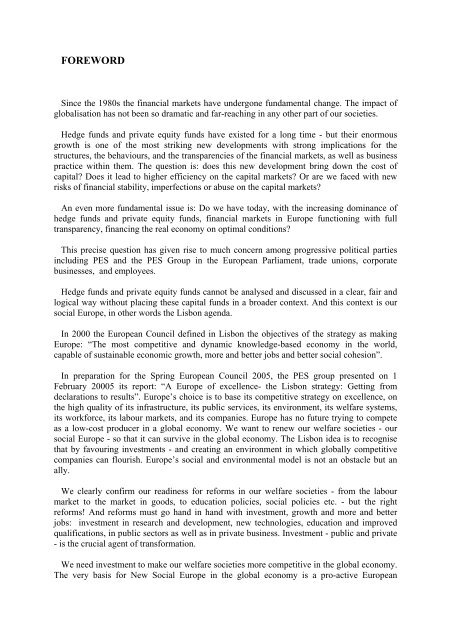Executive summary - Udo Bullmann
Executive summary - Udo Bullmann
Executive summary - Udo Bullmann
- No tags were found...
Create successful ePaper yourself
Turn your PDF publications into a flip-book with our unique Google optimized e-Paper software.
FOREWORDSince the 1980s the financial markets have undergone fundamental change. The impact ofglobalisation has not been so dramatic and far-reaching in any other part of our societies.Hedge funds and private equity funds have existed for a long time - but their enormousgrowth is one of the most striking new developments with strong implications for thestructures, the behaviours, and the transparencies of the financial markets, as well as businesspractice within them. The question is: does this new development bring down the cost ofcapital? Does it lead to higher efficiency on the capital markets? Or are we faced with newrisks of financial stability, imperfections or abuse on the capital markets?An even more fundamental issue is: Do we have today, with the increasing dominance ofhedge funds and private equity funds, financial markets in Europe functioning with fulltransparency, financing the real economy on optimal conditions?This precise question has given rise to much concern among progressive political partiesincluding PES and the PES Group in the European Parliament, trade unions, corporatebusinesses, and employees.Hedge funds and private equity funds cannot be analysed and discussed in a clear, fair andlogical way without placing these capital funds in a broader context. And this context is oursocial Europe, in other words the Lisbon agenda.In 2000 the European Council defined in Lisbon the objectives of the strategy as makingEurope: “The most competitive and dynamic knowledge-based economy in the world,capable of sustainable economic growth, more and better jobs and better social cohesion”.In preparation for the Spring European Council 2005, the PES group presented on 1February 20005 its report: “A Europe of excellence- the Lisbon strategy: Getting fromdeclarations to results”. Europe’s choice is to base its competitive strategy on excellence, onthe high quality of its infrastructure, its public services, its environment, its welfare systems,its workforce, its labour markets, and its companies. Europe has no future trying to competeas a low-cost producer in a global economy. We want to renew our welfare societies - oursocial Europe - so that it can survive in the global economy. The Lisbon idea is to recognisethat by favouring investments - and creating an environment in which globally competitivecompanies can flourish. Europe’s social and environmental model is not an obstacle but anally.We clearly confirm our readiness for reforms in our welfare societies - from the labourmarket to the market in goods, to education policies, social policies etc. - but the rightreforms! And reforms must go hand in hand with investment, growth and more and betterjobs: investment in research and development, new technologies, education and improvedqualifications, in public sectors as well as in private business. Investment - public and private- is the crucial agent of transformation.We need investment to make our welfare societies more competitive in the global economy.The very basis for New Social Europe in the global economy is a pro-active European





